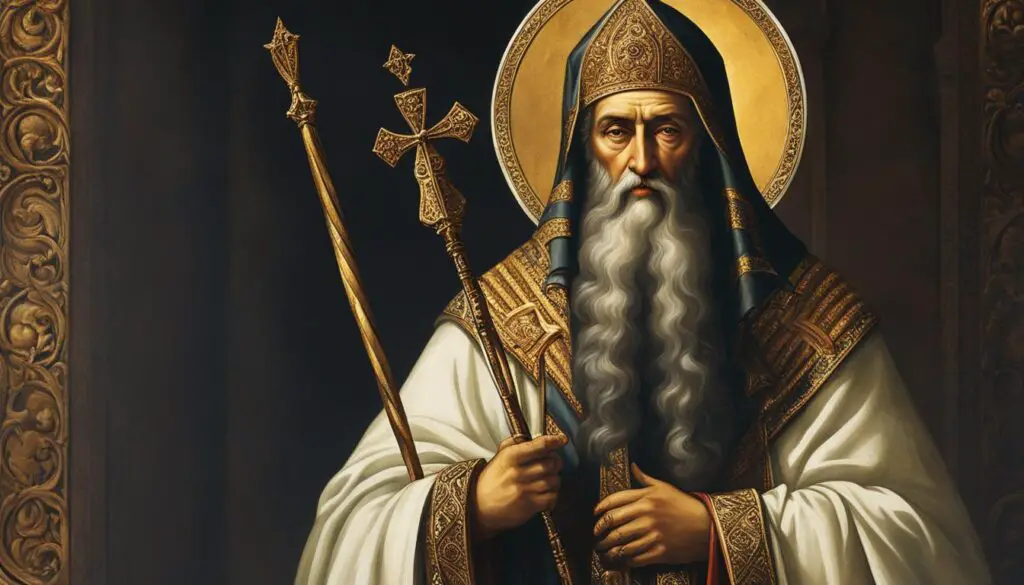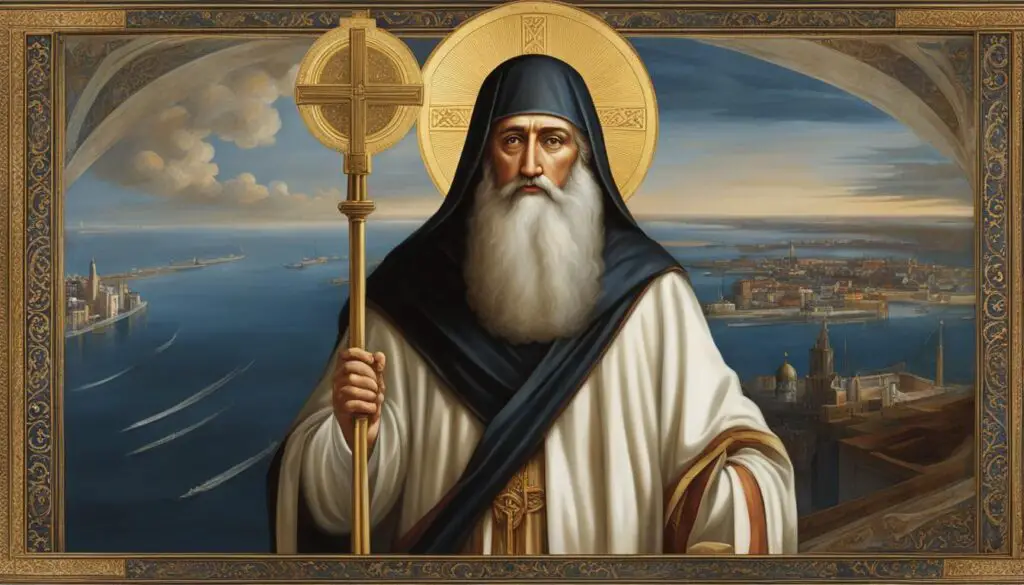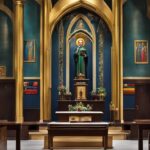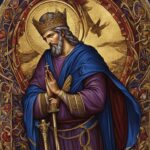St. Cyril of Alexandria, also known as Cyril the Pillar of Faith, was the 24th Pope of the See of Saint Mark in Alexandria. Elected at the age of 36, he was revered for his unwavering commitment to the teachings of the ancient fathers. Cyril played a monumental role in the Christological controversies of his time, defending the divinity of Jesus Christ and vehemently opposing the Nestorian heresy.
Born in Alexandria, Egypt, around 376 AD, Cyril received an exceptional education and theological training, likely at the monastery of Saint Macari. Influenced by his uncle, Theophilus of Alexandria, the Patriarch of Alexandria, Cyril developed a deep understanding of philosophy, theology, and the teachings of the Church Fathers.
Following his education, Cyril embraced monasticism and dedicated himself to a life of piety, asceticism, and prayer. His time as a monk provided a strong foundation for his future leadership role within the Church.
Upon his uncle’s death in 412 AD, Cyril was appointed as the Patriarch of Alexandria. Despite political pressures and tensions, he successfully upheld the preeminence of Alexandria within the Church, while defending Christian orthodoxy and combating heresies.
St. Cyril of Alexandria was known not only for his brilliance and deep spirituality but also for his profound philosophical insights. He emphasized the sacraments, especially the Eucharist, as a means of experiencing the presence of Christ. His extensive writings on various theological topics continue to be revered by theologians and scholars.
While St. Cyril faced challenges and criticisms throughout his lifetime due to his confrontational approach and firm defense of the faith, his commitment to upholding the true teachings of the Church prevailed.
St. Cyril of Alexandria’s influential contributions to Christian theology were widely recognized and celebrated. He received various titles of honor, such as “the Daring Lion,” “the Burnished Lamp,” and “the Second Athanasius.” In 1882, he was officially declared a Doctor of the Church, acknowledging his significant impact on Christian thought and doctrine.
Reputed to have performed numerous miracles during his lifetime, St. Cyril’s holiness and spiritual gifts contributed to his enduring reputation as a saint. After his death in 444 AD, his cult spread, and he is venerated as a saint in the Eastern Catholic, Eastern Orthodox, and Coptic churches.
St. Cyril of Alexandria’s legacy persists in the history of Christianity. His writings and teachings continue to be studied and respected, shaping Christian theology and the understanding of the Incarnation.
Key Takeaways
- St. Cyril of Alexandria, the “Pillar of Faith,” was the 24th Pope of the See of Saint Mark in Alexandria.
- He defended the divinity of Jesus Christ and combated the Nestorian heresy.
- Cyril’s early life and background in Alexandria shaped his theological knowledge and understanding.
- He embraced monasticism and lived a life dedicated to piety, asceticism, and prayer.
- As the Patriarch of Alexandria, Cyril worked tirelessly to safeguard Christian orthodoxy.
Early Life and Background
St. Cyril of Alexandria, a prominent figure in Christian history, was born around 376 AD in Alexandria, Egypt. Growing up in this vibrant, cosmopolitan city, Cyril was exposed to a rich cultural and intellectual environment that influenced his early life.
Cyril received a comprehensive education and theological training, most likely at the renowned monastery of Saint Macari. Under the guidance of dedicated mentors and scholars, he delved into the depths of philosophy, theology, and the teachings of the Church Fathers.
His uncle, Theophilus of Alexandria, who held the esteemed position of the Patriarch of Alexandria, played a significant role in Cyril’s formative years. Theophilus’s influence contributed to Cyril’s understanding of the Christian faith and instilled in him a deep sense of devotion.
Through his upbringing in Alexandria and the guidance of his uncle, Cyril developed a solid foundation in both intellectual and spiritual matters. These early experiences would shape his future path and prepare him for the great responsibilities and challenges that lay ahead.

Mentorship under Theophilus
“Theophilus not only nurtured Cyril’s intellectual growth but also imparted essential wisdom about leadership and stewardship. This mentorship laid the groundwork for Cyril’s future role as a defender of the faith.”
Call to Religious Life
After receiving a solid education at the esteemed monastery of Saint Macari, St. Cyril of Alexandria experienced a profound calling to dedicate his life to the religious path. He felt a strong inner conviction to embrace monasticism, devoting himself wholeheartedly to a life of piety, asceticism, and prayer. Cyril’s decision to enter the monastery was not merely a personal choice but a response to a divine calling that resonated deep within his soul.
In the serene and disciplined environment of the monastery, Cyril immersed himself in the spiritual practices and teachings of the monastic community. He rigorously observed the monastic rule, seeking spiritual purification and enlightenment through self-denial and contemplation. The monastic life provided Cyril with the ideal setting to deepen his relationship with God, cultivating a profound spiritual intimacy and attuning himself to the divine presence.
As Cyril progressed on his spiritual journey, he developed a strong foundation of spiritual discipline, humility, and profound contemplative prayer. The monastic life honed his character, fostering virtues such as patience, self-control, and compassion. Through austere asceticism and a disciplined routine of prayer, Cyril sought to unite his heart with God and develop a deeper understanding of the mysteries of faith.
“Let us, then, ascend to the highest degree of spiritual maturity, like those who, not limiting themselves to perfect obedience to the Kind, dare to carry out deeds of holiness and are not content with mere abstention from the obvious sins.”
– St. Cyril of Alexandria
Cyril’s deep commitment to the religious life did not merely confine him within the walls of the monastery. It served as a preparation for his future role as a leader in the Church, equipping him with the necessary virtues, wisdom, and spiritual insight. The call to religious life was the foundation upon which Cyril would later build his remarkable legacy as a bishop, theologian, and defender of the faith.

The image above depicts St. Cyril of Alexandria, symbolizing his profound devotion to religious life and his significant contributions to the Christian faith. It serves as a visual reminder of Cyril’s journey, from his transformative call to monasticism to his eventual influential position within the Church.
Work
Upon his uncle’s death in 412 AD, St. Cyril of Alexandria was appointed as the Patriarch of Alexandria, a position of great responsibility and leadership within the Church. He carried on the important work that his uncle, Theophilus of Alexandria, had started – asserting the authority of the Alexandrian Church over Constantinople.
Despite political pressures and tensions between the two cities, St. Cyril tirelessly worked to maintain the preeminence of Alexandria within the Church. He firmly defended Christian orthodoxy and took a strong stance against heresies, particularly the Nestorian heresy that denied the divine motherhood of Mary.
“It is essential to preserve the purity of the faith and protect the true teachings of Christ from distortion,” St. Cyril proclaimed.
St. Cyril’s leadership was marked by his unwavering commitment to upholding the truth and his relentless efforts to combat heretical beliefs. He engaged in theological debates and writings, leaving behind a significant body of work that showcased his intellectual prowess and profound understanding of Christian doctrine.

Safeguarding Christian Orthodoxy
One of St. Cyril’s most notable achievements was his role in the Council of Ephesus in 431 AD. In this council, he led the defense of orthodox Christology and advocated for the title “Theotokos,” meaning “Mother of God,” for the Virgin Mary. His theological insights and persuasive arguments played a crucial role in affirming the belief that Jesus Christ is both fully human and fully divine, born of the Virgin Mary.
St. Cyril’s work and leadership in upholding the true faith and combating heresy greatly contributed to the preservation of Christian orthodoxy. His writings and teachings continue to inspire and guide theologians and believers to this day.
Spiritual Life and Philosophy
St. Cyril of Alexandria was renowned for his deep spirituality and profound philosophical insight. Throughout his life, he emphasized the importance of the sacraments, particularly the Eucharist, as a means of experiencing the presence of Christ.
His writings on various theological topics provided invaluable guidance for believers seeking a deeper understanding of their faith. Cyril delved into the nature of Christ, exploring His divine and human natures and asserting His unity in one person. His theological contributions played a crucial role in shaping Christian doctrine and establishing a firm foundation for the Church.
Cyril’s philosophy extended beyond Christology. He elucidated the role and significance of the Church in the spiritual lives of believers. Recognizing the Church as the mystical body of Christ, he emphasized its role as the source of grace and salvation.
Additionally, Cyril’s devotion to the Virgin Mary became a cornerstone of his theological works. He affirmed her as Theotokos, the Mother of God, and emphasized her central role in the Incarnation. His teachings on Mary’s divine motherhood and her cooperation in the redemptive work of Christ continue to inspire devotion to the Blessed Mother.
“The Holy Virgin, Mary, is truly Theotokos, for she gave birth to the One who is truly God.”
St. Cyril of Alexandria’s writings on spiritual life and philosophy continue to be studied and revered by theologians and scholars worldwide. His deep insights and profound faith serve as a guiding light for those seeking a deeper understanding of the Christian faith.

Challenges and Criticisms
Throughout his remarkable life, St. Cyril of Alexandria faced numerous challenges and criticisms. His unwavering commitment to defending Christian orthodoxy and his strong stance against heresies often led to conflicts with other theologians and Church leaders. Despite these challenges, St. Cyril’s steadfastness and dedication to upholding the true faith and the teachings of the Church ultimately prevailed.
Theological Controversies and Conflict
St. Cyril’s confrontational approach and occasionally divisive temperament made him a target of criticism during his time. As a prominent figure in the Church, he found himself embroiled in theological controversies, most notably the Nestorian heresy. His unyielding defense of the divinity of Jesus Christ and the assertion of Mary as the Mother of God drew both admirers and detractors.
“There is only one Incarnate Nature of the Logos, which His own flesh constituted.” – St. Cyril of Alexandria
Disagreements within the Church
St. Cyril’s strong convictions and forceful personality sometimes led to clashes not only with external adversaries but also within the Church itself. His unwavering commitment to upholding the teachings of the Church and his uncompromising approach to theological matters occasionally created tensions and disagreements with fellow theologians and Church leaders.
Legacy of Commitment to Faith
Despite the challenges and criticisms he faced, St. Cyril’s dedication to protecting the integrity of the Christian faith remains a testament to his unwavering commitment. His tireless efforts in defending Christian orthodoxy and combating heresies shaped the development of Christian doctrine, leaving a lasting impact on the understanding of the Incarnation and the role of Mary in Christianity.

Continued Inspiration and Reverence
Today, St. Cyril of Alexandria continues to inspire theologians, scholars, and believers around the world. His writings, including his profound insights on the nature of Christ, the importance of the Church, and the role of the Virgin Mary, are still studied and revered. Though he faced challenges and criticisms during his lifetime, his unwavering commitment to upholding the true faith stands as a testament to his enduring impact on Christian theology and doctrine.
Recognition and Awards
St. Cyril of Alexandria’s unwavering commitment to the Christian faith and his remarkable contributions to theology garnered widespread recognition and earned him numerous awards during his lifetime. His profound influence on Christian thought and doctrine led to his being hailed as a pillar of faith and bestowed with various titles of honor.
Recognizing his courage and fortitude in defending the faith, St. Cyril of Alexandria was often referred to as “the Daring Lion.” This title acknowledged his fearless dedication to upholding Christian orthodoxy and his unwavering commitment to combatting heresies. His relentless pursuit of truth and his ability to articulate and defend the teachings of the Church made him a beacon of inspiration for believers.
St. Cyril of Alexandria was also known as “the Burnished Lamp” because of his brilliant scholarship and intellectual prowess. His writings and theological insights illuminated the path of faith, bringing clarity to complex theological concepts and deepening the understanding of the Church. His profound knowledge of philosophy and the teachings of the Church Fathers secured his place among the great intellectual luminaries of his time.
In recognition of his exceptional contributions, St. Cyril of Alexandria was hailed as “the Second Athanasius.” This title honored his remarkable similarity in spirit, courage, and dedication to St. Athanasius, the esteemed 4th-century Church Father. Like St. Athanasius, St. Cyril of Alexandria played a pivotal role in defending the divinity of Jesus Christ and combating heretical teachings that threatened the established doctrines of the Church.
The Title of Doctor of the Church
In 1882, St. Cyril of Alexandria was officially honored with the prestigious title of “Doctor of the Church.” This recognition by the Catholic Church acknowledged his immense theological contributions and the enduring impact of his writings on Christian thought and doctrine.
As a Doctor of the Church, St. Cyril of Alexandria stands alongside other revered theologians, such as St. Augustine, St. Thomas Aquinas, and St. Teresa of Avila. His teachings and writings continue to shape the understanding of Christian theology, serving as a source of inspiration and guidance for theologians, scholars, and believers alike.
| Date | Title or Award |
|---|---|
| 1882 | Official Declaration as Doctor of the Church |
Miracles and Path to Sainthood
Throughout his life, St. Cyril of Alexandria was known for his remarkable spiritual gifts and the performance of numerous miracles. These extraordinary acts served as a testament to his holiness and the divine favor that accompanied his dedicated life of faith.
St. Cyril’s miracles encompassed a wide range of supernatural interventions. He was renowned for his ability to heal the sick and infirm, restoring them to health and wholeness. Through his prayers and intercession, many individuals experienced miraculous recoveries and were freed from physical suffering.
In addition to healings, St. Cyril was credited with performing exorcisms, liberating those afflicted by demonic oppression and possession. His unwavering faith and spiritual authority allowed him to confront the forces of darkness and bring deliverance to those in need.
Perhaps one of the most transformative miracles attributed to St. Cyril was his success in converting non-Christians to the faith. His message of love, forgiveness, and salvation resonated deeply with those who encountered him, leading them to embrace Christianity and commit their lives to Christ. Through his persuasive preaching and powerful witness, St. Cyril played a significant role in expanding the reach of the Gospel.
After his death in 444 AD, St. Cyril’s reputation as a saint quickly spread among the faithful. The accounts of his miracles, combined with his profound impact on the Church and his unwavering commitment to upholding Christian truth, solidified his place as a revered figure in the Eastern Catholic, Eastern Orthodox, and Coptic churches.
Legacy and Continuing Influence
St. Cyril of Alexandria, a prominent figure in the history of Christianity, left behind a profound and enduring legacy. His writings and teachings, meticulously studied and respected by theologians and scholars, continue to shape the theological discourse within the Christian faith.
A central aspect of St. Cyril’s legacy lies in his defense of the divinity of Jesus Christ and his emphasis on the role of Mary as the Mother of God. Through his theological contributions, St. Cyril played a pivotal role in shaping Christian doctrine, particularly during the Christological controversies of his time. His insights into the Incarnation continue to inform our understanding of the profound mystery of God becoming human.
Despite facing challenges and criticisms throughout his life, St. Cyril’s tenacity and unwavering commitment to upholding the true faith elevated him to be recognized as a pillar of the Church. His impact was not limited to his contemporaries; his influence continues to reverberate through the centuries, inspiring spiritual seekers and theologians alike.
St. Cyril’s lasting legacy serves as an invitation for reflection and deep thinking within the Christian community. As we delve into his writings and teachings, we are reminded of the rich intellectual and spiritual heritage that has been passed down through generations. St. Cyril’s enduring influence encourages us to engage with Christian theology and strengthen our faith through a deeper understanding of the foundational truths he defended.
FAQ
Who was St. Cyril of Alexandria?
St. Cyril of Alexandria, also known as Cyril the Pillar of Faith, was the 24th Pope of the See of Saint Mark in Alexandria. He was a prominent early Christian theologian and played a crucial role in the Christological controversies of his time.
Where was St. Cyril of Alexandria born?
St. Cyril of Alexandria was born in Alexandria, Egypt, around 376 AD.
What were some of St. Cyril of Alexandria’s contributions to Christian theology?
St. Cyril of Alexandria defended the divinity of Jesus Christ and opposed the Nestorian heresy. He emphasized the importance of the sacraments, particularly the Eucharist, and wrote extensively on various theological topics.
What challenges did St. Cyril of Alexandria face during his lifetime?
St. Cyril of Alexandria faced conflicts with other theologians and Church leaders due to his strong stance against heresies and his confrontational approach to defending the faith.
How was St. Cyril of Alexandria recognized and honored?
St. Cyril of Alexandria was hailed as a pillar of faith and received various titles of honor, such as “the Daring Lion,” “the Burnished Lamp,” and “the Second Athanasius.” He was officially declared a Doctor of the Church in 1882.
Did St. Cyril of Alexandria perform miracles?
Yes, St. Cyril of Alexandria was reputed to have performed numerous miracles during his lifetime, including healings, exorcisms, and the conversion of non-Christians.
What is St. Cyril of Alexandria’s legacy?
St. Cyril of Alexandria’s writings and teachings continue to be studied and respected by theologians and scholars. His defense of the divinity of Jesus Christ and his emphasis on the role of Mary as the Mother of God have had a profound impact on Christian theology.
















